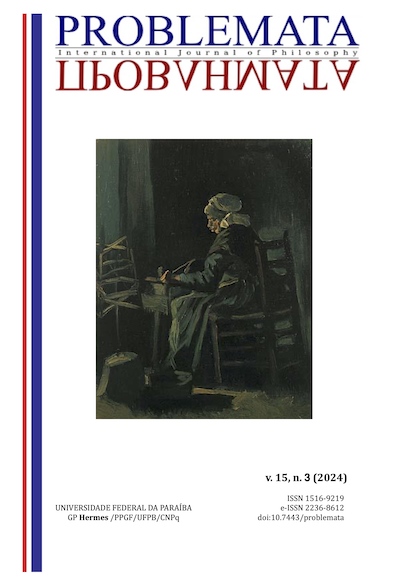TWO CONCEPTS, TWO MEANINGS:
EXOTERIC INHALT, ESOTERIC GEHALT
DOI:
https://doi.org/10.7443/problemata.v15i3.70351Keywords:
Aesthetics, Music, Concept, ContentAbstract
This paper derives from the second chapter of the dissertation defended by Silva (2023), which expresses the analysis of our philosopher in his book "Aesthetics Courses - Vorlesungen über Die Ästhetik". As an aesthetical philosophical system, it elects different art forms and understands the aesthetic universe in particular categories of artistic beauty. Thus, the historical-spiritual development of the senses is fulfilled with the aid of a philosophy of aesthetic feel. Music as a product of the Spirit is also represented in different art forms, namely symbolic, classical, and romantic. This aesthetic philosophical product ends two key concepts: [Inhalt] and [Gehalt]. Thus, to think of layers that contain a higher level of spiritual interiority, such concepts will be presented as symbols, while they can express two senses and two possible meanings. Our analytical and qualitative methodological path exposes how we understand the meaning expressed in the concept content that can be both exoteric (outside) and esoteric (internal). Finally, there will be an updated reading of the concepts of musical aesthetic theory and dialogue with renowned interpreters of Hegel's aesthetic philosophy, such as Raposo (2019), Kurle (2016), and Videira (2009), among others.
Downloads
References
HEGEL, G.W.F. Cursos de Estética. Volume I; tradução de Marcos Aurélio Werle; revisão de Márcio Seligmann Silva; consultoria Victor Knoll e Olivier Toller – 2.ed.rev. 1 reimpr. – São Paulo: Editora da Universidade de São Paulo, 2015 – (clássicos; 18).
HEGEL, G.W.F. Cursos de Estética III; tradução de Marcos Aurélio Werle; revisão de Márcio Seligmann Silva; consultoria Victor Knoll e Olivier Toller – 2.ed.rev. 1 reimpr.– São Paulo: Editora da Universidade de São Paulo, 2014 – (clássicos; 14).
HEGEL, G.W.F. Ciência da Lógica: 3. A Doutrina do Conceito. Tradução Christian G. Iber, Federico Orsini. Petrópolis, RJ: Vozes, 2018.
BARROS, Fernando R. de Moraes. Ao som do emaranhamento: a música e o discurso filosófico sobre as artes. Kriterion, Belo Horizonte, nº 125, Jun./2012, p. 195-229. Disponível em: https://doi.org/10.1590/S0100-512X2012000100010. Acesso em 14 jun. 2021.
FUBINI, E. Estética da Música; tradução de Sandra Escobar. Edições 70, Lisboa, Portugal, 2008.
HAN, BYUNG-CHUL. Bom entretenimento: uma desconstrução da história da paixão ocidental; tradução de Lucas Machado. Petrópolis, RJ: Vozes, 2019.
JÚNIOR, I,L, de A. A experiência musical e a interpretação simbólico-transcendental a partir de Ernst Cassirer e Susanne Langer. Griot: Revista de Filosofia, Amargosa – BA, v.19, n.3, p.230-246, outubro, 2019. Disponível em: https://doi.org/10.31977/grirfi.v19i3.1224 Acesso em: 05 maio 2024.
KURLE, Adriano Bueno. A Tonalidade da Razão: a historicidade da música em Hegel, e o caso Shoenberg - 2016. 266 f. Tese (Doutorado - Programa de Pós-Graduação em Filosofia). Pontifícia Universidade Católica do Rio Grande do Sul, Rio Grande do Sul, 2016.
MORAIS, P. A música em Hegel e Hanslick: transição de uma estética musical do conteúdo para uma estética musical da forma / Pablo de Morais; orientador, Mario Rodrigues Videira Júnior - São Paulo, 2018. 318 p. Dissertação de Mestrado - Programa de Pós-Graduação em Música - Escola de Comunicações e Artes / Universidade de São Paulo.
NOGUEIRA, M. Da Ideia à experiência da Música. Revista Claves n.° 7 - Maio de 2009 (p. 7 a 22). Disponível em: https://periodicos.ufpb.br/index.php/claves/about. Acesso em: 22 maio 2024.
RAPOSO, RR. A música na estética de Hegel. In: Teses e dissertações USP. (pp.41), 2019. Disponível em: https://www.teses.usp.br/teses/disponiveis/8/8133/tde-18022020-170027/pt-br.php. Acesso em: 21 maio 2024.
REZENDE. C, C. O momento hegeliano da estética: a auto-superação da arte. Revista Kínesis, Vol. I, n° 01, Março-2009, p.12-21. Disponível em: https://revistas.marilia.unesp.br/index.php/kinesis/article/view/4289. Acesso em: 20 de maio 2024.
SILVA, K. G. (2023). OUTRO CONTEÚDO MUSICAL ESTÉTICO: a realização do conceito. PÓLEMOS – Revista De Estudantes De Filosofia Da Universidade De Brasília, v.12 n.(26), 153–180. Disponível em: https://periodicos.unb.br/index.php/polemos/article/view/48030. Acesso em: 10 maio 2024.
TRINDADE, M. S. Relação entre dialética e tonalidade na estética musical de Hegel: o retorno a si mesmo como conteúdo verdadeiro da obra. 2011. 190 f. Dissertação (Mestrado em Filosofia) - Universidade Federal de Ouro Preto, Ouro Preto, 2011
VIDEIRA JR, M. R. A. A linguagem do inefável: música e autonomia estética no romantismo alemão. Tese de doutorado defendida no ano de 2009 na Universidade de São Paulo.
WERLE. AM. Notas sobre a filosofia da música. Revista Música, São Paulo V. 15 N. 1, pp. 91-101, 2015. Disponível em: http://www.revistas.usp.br/revistamusica/article/view/114703. Acesso em: 30 abr. 2024.
WISNIK, José Miguel. O Som e o Sentido: Uma outra história das músicas. 2. ed. São Paulo: Companhia das Letras, 1989.
Downloads
Published
Issue
Section
License
Copyright (c) 2024 Kaique Silva

This work is licensed under a Creative Commons Attribution 4.0 International License.
Authors who publish with this journal agree to the following terms:
- Authors retain copyright and grant the journal right of first publication with the work simultaneously licensed under a Creative Commons Attribution License that allows others to share the work with an acknowledgement of the work's authorship and initial publication in this journal.
- Authors are able to enter into separate, additional contractual arrangements for the non-exclusive distribution of the journal's published version of the work (e.g., post it to an institutional repository or publish it in a book), with an acknowledgement of its initial publication in this journal.
-
- Authors are permitted and encouraged to post their work online (e.g., in institutional repositories or on their website) prior to and during the submission process, as it can lead to productive exchanges, as well as earlier and greater citation of published work (See The Effect of Open Access).





